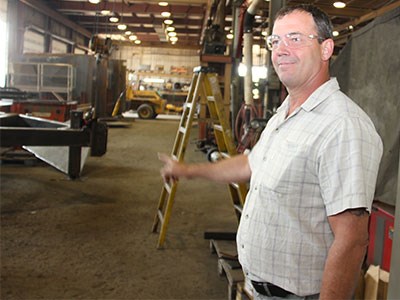Were it not for an aggressive stance to diversify its manufacturing line, Marcotte Mining Machinery Services Inc., which celebrates its 35th year in business this year, may have faced the same financial difficulties as some of its competitors, such as the newly bankrupt Cast Resources.
“With the recession things started to get really cyclical in mining,” said Dennis Rienguette, the company's general manager. “We had no choice but to look at what else we could do in these slow times.”
By the time the recession hit in 2008, Marcotte had already started to diversify its line of mining products.
The company had already expanded to include mine winching and hoisting solutions for its customers, and had started to create all-in-one Swiss Army knife solutions with its underground mining equipment.
“Now we're at the point where they (customers) don't want three pieces of equipment, they want one to do all three jobs,” Rienguette said.
Marcotte's MultiRAM vehicle, for instance, allows underground miners to install ventilation units, change scoop tram tires and set up water pipes with the same piece of equipment.
It would have taken three vehicles to complete the same jobs previously.
The all-in-one approach saves mining companies money on initial capital investments, vehicle maintenance and operational costs.
Multi-purpose underground vehicles like the MultiRAM also address a growing cost as mines go deeper underground: ventilation.
“Whenever you send a piece of equipment that's diesel powered underground you need to have an equivalent amount of ventilation,” said Mark Dunseith, Marcotte's general sales and marketing manager.
A diesel-powered vehicle that does three jobs, instead of just one, requires only a third of the ventilation needed for the three vehicles it replaced.
Dunseith said mining equipment advancements in recent years have focused on increased safety and efficiency.
“There are not many things in mining they don't know how to do,” he said.
To meet those needs, Marcotte has turned to customized approaches that meet their customers' specific safety and efficiency needs.
But even with new mining products, Marcotte would have stagnated during the mining down-cycle that came with the recession.
“This isn't just a part of survival for us, but it's part of expansion as well,” Dunseith said.
To expand, the company looked at other markets to grow the business.
Manufacturing equipment for the offshore oil and gas sector, and the power generation industry, turned out to be natural fits for Marcotte.
Marcotte's parent company – Woodstock, Ontario-based Timberland Machines Ltd. – already had expertise in both areas.
In the 1960s and 1970s Timberland started to manufacture conductor handling equipment used to set up power transmission lines.
In 1998, Timberland acquired Almon Johnson Ltd., based out of Eatontown, New Jersey, which produced a line of marine deck machinery and winches.
Marcotte was able to tap into that in-house expertise to expand its own manufacturing base.
“We're assisting in fabrication of chain jack assemblies and mooring systems that are used for oil platforms,” Dunseith said. “It's a very solid business model. When oil and gas is going great, mining typically is not.”
The company also builds trailer-based mobile equipment used to install power lines. The product line has proven to be successful, Dunseith said, with new hydroelectric projects – such as Nalcor Energy's Lower Churchill Project in Labrador – coming online.
Municipalities are also looking to update outdated power grids that are more susceptible to ice storms and other severe weather events.
Marcotte exports about half of its products outside of North America.
With its recent diversification, the company has ambitious plans to double in growth every five years.
Marcotte is already well on its way to meet that target.
Before entering new sectors, Marcotte had 12 full-time employees on its fabrication floor. The company now employs 24 people in fabrication.
Its manufacturing plant occupies 35,000 square feet off of Sudbury's Lasalle Boulevard, and Dunseith said the goal is to expand to 50,000 square feet by 2019.
Marcotte owns a 10-acre lot around its plant, which gives it a lot of space for future expansion.
While the new business ventures have proven to be successful, Dunseith said the company will not leave mining behind, even during tough times for the sector.
“When metal prices increase you'll see their interest to move (new mines) forward accelerate,” he said. “Right now, no one wants to spend any money.”
But with nickel prices seemingly on the rise, it could just be a matter of time before the local mining sector breaks free of its current down-cycle, he said.
“Our hearts are here (in Sudbury),” he added.




